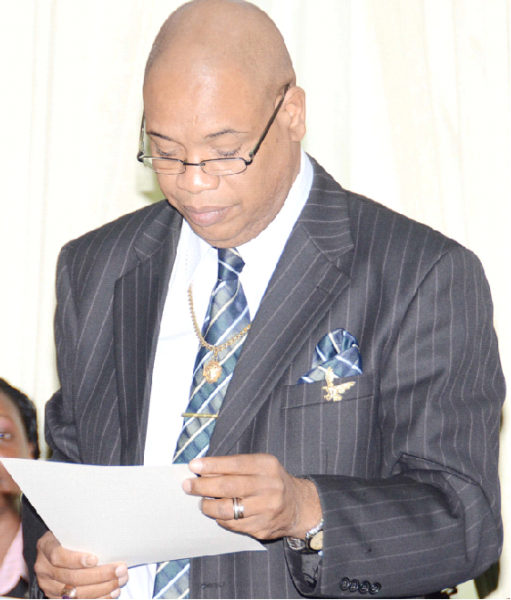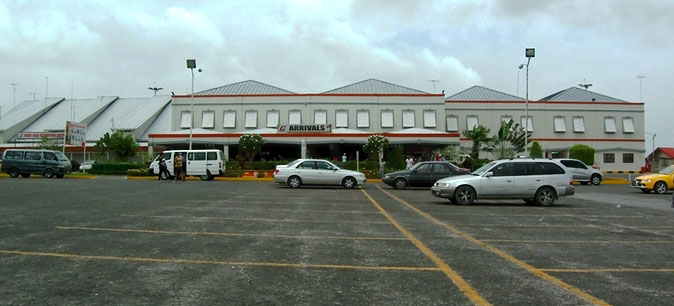While China Harbour Engineering Company Limited (CHEC) is maintaining that it has completed 97% of works on the US$138 million Cheddi Jagan International Airport (CJIA) expansion, Minister of Public Works Juan Edghill yesterday said the government’s records show a vast difference with less than half of the agreed 17,000 square metres covered under the original agreement completed.
As a result, Edghill is standing by President Irfaan Ali as he currently negotiates with the Government of China to ensure that this country gets what taxpayers are paying for, he said.
“The president is leading the discussions with the Chinese at the highest level, which I am a part of. So every demand that you see I made or ever made, it is what the president has communicated to the Chinese contractor and they are aware of it,” Edghill told Stabroek News.

“I don’t know how they can say they are 97% complete. They probably are, in the eyes of Patterson [former Minister of Public Infrastructure and Edghill’s predecessor], that 97% complete but not in the eyes of Edghill,” he added.
According to Edghill, the new building built by the company is 7,200 square metres. “They rehabilitated 6,800 square metres. Even if you add the two together, you still have 3,250 square metres [more to go]. And that is if you count the rehabilitated as new and it cannot be counted as new,” he stressed.
“In terms of the work that is already completed, that they say is 97% completed, there [are] 1,500 defects that have been pointed out to them by way of letters. Then recently, there were 72 items they were going to fix to make the airport functional, before December 31st [2020]. The 72 items ain’t fixed yet! Then you have an airport, when you approach it, you think it is a warehouse. The whole [exterior] façade in the front there you have to fix… That is supposed to be glass right up to the top,” he said.
Edghill said that it would be dereliction for government to accept the current airport for the cost agreed to and at the end of the day taxpayers would hold the PPP/C government accountable if it is accepted under this administration.
“What will the people of Guyana do to me if I or anyone in government accepts that for US$150 million? That is suicide you are committing. The bottom line is they have to get it fixed,” he declared.
“We expect, according to the contract, 17,005 square metres of new terminals. Right now we have 4,000. [We need] an extended runway, taxiways and aprons with capacity for eight standing aircraft, facilities to accommodate eight air bridges, new terminal building, 7,000 square feet, bottom line. Let us get close to that,” he emphasised.
Having dealt with three governments since the start of the controversy-ridden project in January of 2013, CHEC on Monday issued a statement and detailed the various alterations to the project and how the changes in government impacted the project.
The company said that the project was 97% completed at the end of 2019 and it says it has since provided the PPP/C government with a revised schedule of works and other outstanding matters as per the existing contract.
Timeline
Giving a timeline for the changes that occurred to the original contract and the various extenuating circumstances, including a cutoff of funding from China’s Exim Bank, the statement explained that the contract, which was signed on November 11, 2011, for US$138 million between the then Government and CHEC, had a specific Scope of Works to be included in the price. It said it officially started on January 16, 2013.
CHEC stated that the contract established that the contractor’s submission of the price had certain conditions, and, importantly, it excluded the handling equipment and the removal of the existing terminal, among other things, and specifically set out the employer’s responsibility to supply the equipment for eight bridges and other handling equipment.
The Chinese company added that geotechnical investigations of the location exposed unforeseen conditions compared to the original data provided to the contractor. After discussions, both parties reached an agreement that the original contract plan could not be implemented, CHEC said. The employer then instructed CHEC to provide alternatives, the statement said.
In 2013, CHEC said that it provided several options, each of which included an increase in the sizes of the apron and taxiway areas with the relevant cost due to the variation to the employer and in January 2015, the employer informed the contractor that it had chosen one of the alternative proposals submitted.
CHEC pointed out that during the period January 2013 to May 2015, budget allocations for the Project were not approved by Parliament, which prevented the contractor from executing the works as planned. This had been as a result of the then APNU and AFC-controlled Parliament.
The contractor said that works restarted on the project in May 2015 but were halted when the new APNU+AFC administration requested a review of the project and advised CHEC to suspend construction during the review period.
After the review period ended, CHEC said that both parties agreed to the revised terms, which considered the government’s budget, changes, and claims to the project prior to 2015. CHEC said that it also included an adjustment to the scope of work to adapt to the total contract value. Both parties, it said, signed a Variation of the Contract Agreement in October, 2015.
The revised scope of work replaced the new departure terminal building, parking aprons, and eight boarding bridges – to be supplied by the Government of Guyana – with a renovation of and new construction area in the existing departure terminal building, parking aprons and four boarding bridges, two of which were to be supplied by the contractor and the two by the government.
Stopped disbursements
CHEC added that due to the general elections held in Guyana in 2015 and the contract variations that arose thereafter, China’s Exim Bank, because of the risks involved, stopped disbursements on the loan. From January 2013 to the early months of 2016, CHEC said that it funded the execution and construction of the project from its financial resources.
In January 2016, CHEC said that the preliminary plan for redesigning the terminal building was agreed upon between the parties. The renovation of the departure terminal and the construction of the new arrival terminal building began.
It added that by the end of 2019, the project was 97% complete but the general elections of 2020, coupled with the global pandemic, forced CHEC to significantly reduce its workforce, which again affected the project’s completion.
Following the declaration of the elections result, CHEC said that the new government, through the Ministers of Public Works and President Irfaan Ali, visited the project site and made several public observations and statements.
Ali had visited in the presence of China’s Ambassador to Guyana Cui Jianchun. Ali in a statement from the Office of the President after the visit had expressed dissatisfaction with the state of the expansion project and said that he would only accept the expansion works as was outlined in the original contract.
“I am holding everyone responsible; the contractor, the consultant, the project management team…this is not acceptable for the Guyanese people. In this current position it is very clear from all that I have seen and heard, and from all the questions asked, it is very clear that something is horribly wrong. The right decision at this moment is that we cannot accept this,” he said.
CHEC said that it has “paid careful attention to those statements and, on September 29th and 30th, immediately dispatched its Vice President Liu from Beijing and the President of its Americas Division Dr. Zhimin Hu. Since then, CHEC has provided to the Government of Guyana through the Ministers of Public Works and the Office of the President comprehensive updates on the Project, including a revised schedule of works and other outstanding matters as per the present existing contract.”
The company said it wanted to clarify that its commitments to the government are to comply with the request under the current contract signed between the parties. Presently, CHEC said it is engaged in discussions with the government and is fully cooperating to seek the delivery of the project according to its contractual obligations.
“It is our hope that the comprehensive synopsis provided here will bring clarity about the Project so that future reports can be accurate in its interpretation of the scope of the Project”, the statement said.
For the government of Guyana, the contract must be at least significantly “close” to the PPP/C’s original design of 17,000 square meters. (Marcelle Thomas)






